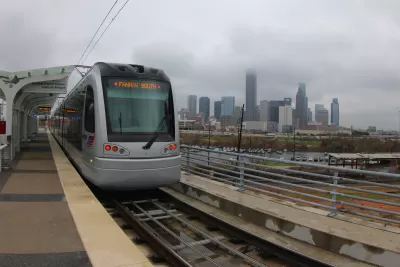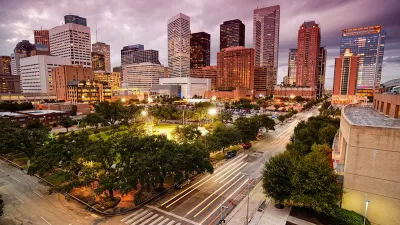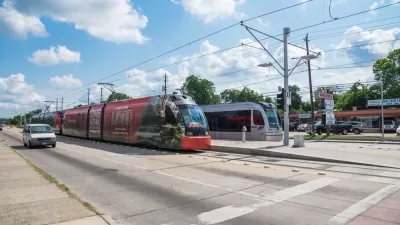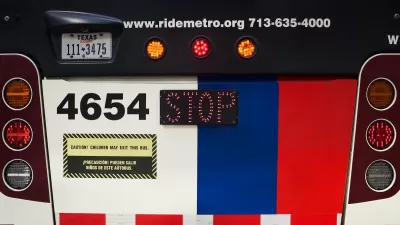While ridership dropped during the pandemic, many 'essential workers' continued to rely on Houston Metro's services, signaling the crucial role of public transit for the city's economy.

Dug Begley describes the findings of a report from Air Alliance, transportation advocacy group LINK Houston and the Robert D. Bullard Center for Environmental and Climate Justice at Texas Southern University that calls for greater funding of public transportation in the Houston region.
"Overall, Metro ridership dropped to about one-eighth normal levels early in the pandemic, leading the agency to drastically scale back bus and train service." But "many said the service offered was a crucial lifeline." According to researcher Nikki Hawkins-Knight, "[w]e cannot continue to build cities and hope to positively impact the health of our economy and communities without frequently assessing the impacts, deficiencies and user needs." Hawking-Knight goes on to say "[t]he transit ecosystem must integrate safety, sanitation, connectivity and overall reliability for it to be a true asset."
"The findings, authors said, point to more transit investment as a way to keep key employees showing up for work, offer a viable and safe option for travel and reduce pollution all at once." Ashley Johnson, director of community affairs at LINK Houston and a study co-author, says "Metro must continue to restore service and equitably implement its Moving Forward Plan as the COVID-19 pandemic demonstrates the vital role public transit plays in the economic vitality of our region."
FULL STORY: Despite fewer people riding Metro in Houston, report makes case for more public transit

Planetizen Federal Action Tracker
A weekly monitor of how Trump’s orders and actions are impacting planners and planning in America.

Congressman Proposes Bill to Rename DC Metro “Trump Train”
The Make Autorail Great Again Act would withhold federal funding to the system until the Washington Metropolitan Area Transit Authority (WMATA), rebrands as the Washington Metropolitan Authority for Greater Access (WMAGA).

The Simple Legislative Tool Transforming Vacant Downtowns
In California, Michigan and Georgia, an easy win is bringing dollars — and delight — back to city centers.

The States Losing Rural Delivery Rooms at an Alarming Pace
In some states, as few as 9% of rural hospitals still deliver babies. As a result, rising pre-term births, no adequate pre-term care and harrowing close calls are a growing reality.

The Small South Asian Republic Going all in on EVs
Thanks to one simple policy change less than five years ago, 65% of new cars in this Himalayan country are now electric.

DC Backpedals on Bike Lane Protection, Swaps Barriers for Paint
Citing aesthetic concerns, the city is removing the concrete barriers and flexposts that once separated Arizona Avenue cyclists from motor vehicles.
Urban Design for Planners 1: Software Tools
This six-course series explores essential urban design concepts using open source software and equips planners with the tools they need to participate fully in the urban design process.
Planning for Universal Design
Learn the tools for implementing Universal Design in planning regulations.
Smith Gee Studio
City of Charlotte
City of Camden Redevelopment Agency
City of Astoria
Transportation Research & Education Center (TREC) at Portland State University
US High Speed Rail Association
City of Camden Redevelopment Agency
Municipality of Princeton (NJ)





























